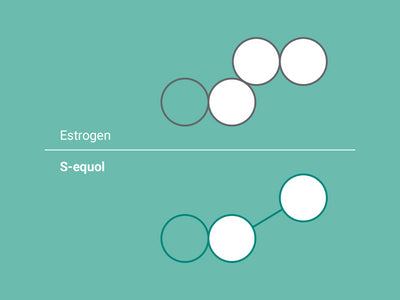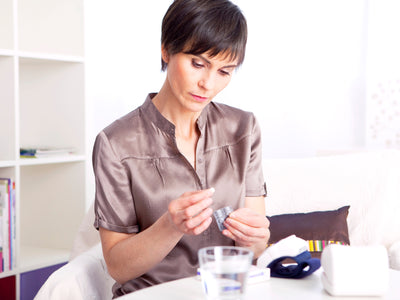
Why Premature Ovarian Insufficiency Can Cause Early Menopause, Difficulty Getting Pregnant, and More
For many women, menopause symptoms such as night sweats, hot flashes, and irritability are a somewhat expected part of menopause. They’re disruptive and troublesome, but even the worst hot flash will pass. Other symptoms, however, such as difficulty getting pregnant, vaginal dryness, or a decreased sex drive can have a lasting impact on a woman’s life—especially if she enters menopause earlier than expected. One such cause of early menopause is premature ovarian insufficiency (POI), and nearly 1% of women younger than 40 in the United States experience this condition.1
Premature ovarian insufficiency happens when a woman’s ovaries stop working normally before age 40.2 That said, women can still experience POI after age 40 and their risk factors actually increase with age.2 While infertility and difficulty getting pregnant are big reasons why women with POI turn to their health care practitioner for guidance, POI can also have other long-term effects on a woman’s overall health.3, 2 As such, it’s important to be educated about this condition so you’re better equipped to handle whatever menopause throws your way.
Premature Ovarian Insufficiency Can Cause Early Menopause
The natural menopause transition comes in three stages: perimenopause, menopause, and postmenopause. Perimenopause usually begins in a woman’s early- to mid-40s and lasts for a few years before hitting menopause and completing the full transition by the average age of 51. Menopause itself lasts for only 24 hours and marks the first full day after a year since your last period, and postmenopause is every day after that.
Premature ovarian insufficiency can cause early menopause, as the ovarian production of estrogen declines which can trigger a chain reaction of sorts, telling your body the menopause transition has begun. Early menopause can also occur due to other facts and happens when you complete the menopause transition between ages 40-45. It can happen naturally or be a result of surgically induced menopause from operations such as ovarian surgery or a hysterectomy. Women who go through early menopause will never have another normal period again and can’t get pregnant.3 No matter how one may enter early menopause, it’s important to be proactive in your wellness as early menopause and POI can contribute to various aspects of health.
Premature Ovarian Insufficiency Can Cause Health Complications, Including Infertility
Estrogen plays so many key roles in a woman’s body, it’s no surprise that such a marked decline of estrogen early in life can lead to health complications.4 While these complications are common enough in women without POI, they are more common in women experiencing it:4
- Most women with POI can’t get pregnant naturally.4 If they want to carry a pregnancy to term, they often need to use donor eggs.4 For many women with POI, difficulty getting pregnant or infertility is a common reason they go see their doctor.2
- Heart disease. Lower estrogen levels can increase cholesterol buildup in the arteries and affect the muscles lining the arteries. Both of these factors increase the risk for artherosclerosis (hardening of the arteries).2
- For many women, this unexpected loss of ovarian function is a source of deep sadness and even anger. These feelings are completely natural, and also a good reason for reaching out to a therapist or doctor.4
- Low thyroid function. Hypothyroidism can happen when the thyroid gland doesn’t produce enough hormones.5, 2 Low thyroid hormones can affect your metabolism, energy levels, and mental activity.2
- Women with POI often develop osteoporosis as a result of low estrogen levels.2
Why Does Osteoporosis Accelerate After Menopause And Other Bone Health Questions Answered
Premature Ovarian Insufficiency Shares Similar Symptoms With Menopause
Considering one of the first signs of POI is irregular or missed periods, it’s not surprising POI often gets overlooked as the beginning of menopause.2 Periods may occur off and on—and might even start up again many years after POI was initially diagnosed.4
Because of the estrogen level decline that accompanies POI, women may also experience many menopause-like symptoms, including:2, 4
- Irregular or missed periods
- Hot flashes
- Night sweats
- Irritability, depression, or anxiety
- Trouble sleeping
- Decreased sex drive
- Vaginal dryness
- Pain during sex
- Trouble with concentration or memory
If you’re experiencing any of the above symptoms, talk to your health care practitioner to see if it’s menopause or something more.
The Exact Cause of Premature Ovarian Insufficiency Is Often Unknown
In nearly 90% of cases, the exact cause of POI is unknown.2 Some research points to follicles, which are found in the ovaries.2 Follicles are the small sacs in which a woman’s eggs grow and mature.2 POI could be related to running out working follicles earlier than expected, or to follicles that aren’t working properly.2 In most cases, however, the cause of the follicle problem remains unknown.2
Some causes of follicle problems that could lead to POI may be:2
- A low number of follicles
- Metabolic disorders
- Autoimmune diseases, including thyroiditis and Addison disease
- Genetic disorders such as Fragile X syndrome or Turner syndrome
- Toxins, such as cigarette smoke, chemicals, and pesticides
Other risk factors for premature ovarian insufficiency are:2
- A family history of POI in other women such as mothers, sisters, or aunts
- Cancer treatments such as chemotherapy and radiation therapy
- Younger women can get POI, but it’s more common between the ages of 35-40.
How To Stay Healthy With Premature Ovarian Insufficiency
Currently, there is no proven treatment for POI. As such, learning to stay healthy while living with this condition can help the experience go far more smoothly. Here are a few treatments and tips for staying healthy while living with POI:
- Seek treatment for related health conditions. While POI may not have a treatment, some of the other health conditions related to POI may have treatments available.2
- Explore if IVF is right for you. If you’re experiencing POI but still wish to become pregnant, in vitro fertilization (IVF) may be an option worth considering.2
- Stay active: Regular physical activity can help lower your risk for osteoporosis and heart disease.2
- Increase your calcium and vitamin D intake: Calcium and vitamin D are two key nutrients when it comes to supporting bone health throughout life, but especially as you age. Because women with POI are at a higher risk for osteoporosis, it’s important to ensure your body is getting enough of these bone health support nutrients.2 You can get an easy blood test from your doctor to check your levels of calcium and vitamin D, and see if supplementation is right for you.
- Stay plugged in to your preventative care. Menopause can lead to other health conditions on its own, as this marked decline of estrogen is felt throughout the body. Stay in touch with your doctor and continue your regular checkups even after your last period, to ensure you’re doing everything you can to help support your overall health during this stage.
Staying Positive With Premature Ovarian Insufficiency
Premature ovarian insufficiency may not be the best-known condition associated with menopause but being diagnosed with it would have a physical and emotional effect on any woman. POI can throw off family plans, career plans, and introduce a host of health complications. When it comes to conditions like there, where we don’t yet know the causes or the treatments, staying up to date on the latest research is one of the best decisions you can make. And if you’ve made to the end of this 1200-word article about POI—you’re already doing a pretty amazing job.
References
- Torrealday, S et al. Premature Ovarian Insufficiency - an update on recent advances in understanding and management. F1000Research. 2017;6:2069 https://www.ncbi.nlm.nih.gov/pmc/articles/PMC5710309/#ref-15
- US National Library of Medicine. “Primary Ovarian Insufficiency.” 2020. MedlinePlus. Accessed on: August 12, 2020. https://medlineplus.gov/primaryovarianinsufficiency.html
- US Department of Health and Human Services. National Institutes of Health. “Primary Ovarian Insufficiency (POI): Condition Information.” 2016. Eunice Kennedy Shriver National Institute of Child Health and Human Development. Accessed on: August 12, 2020. https://www.nichd.nih.gov/health/topics/poi/conditioninfo/default
- Endocrine Society. “Primary ovarian insufficiency.” 2018. Hormone Health Network. Accessed on: August 12, 2020. https://www.hormone.org/diseases-and-conditions/primary-ovarian-insufficiency
- US National Library of Medicine. “Hypothyroidism.” 2020. MedlinePlus. Accessed on: August 12, 2020. https://medlineplus.gov/hypothyroidism.html


